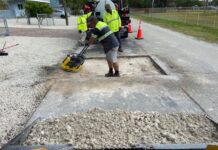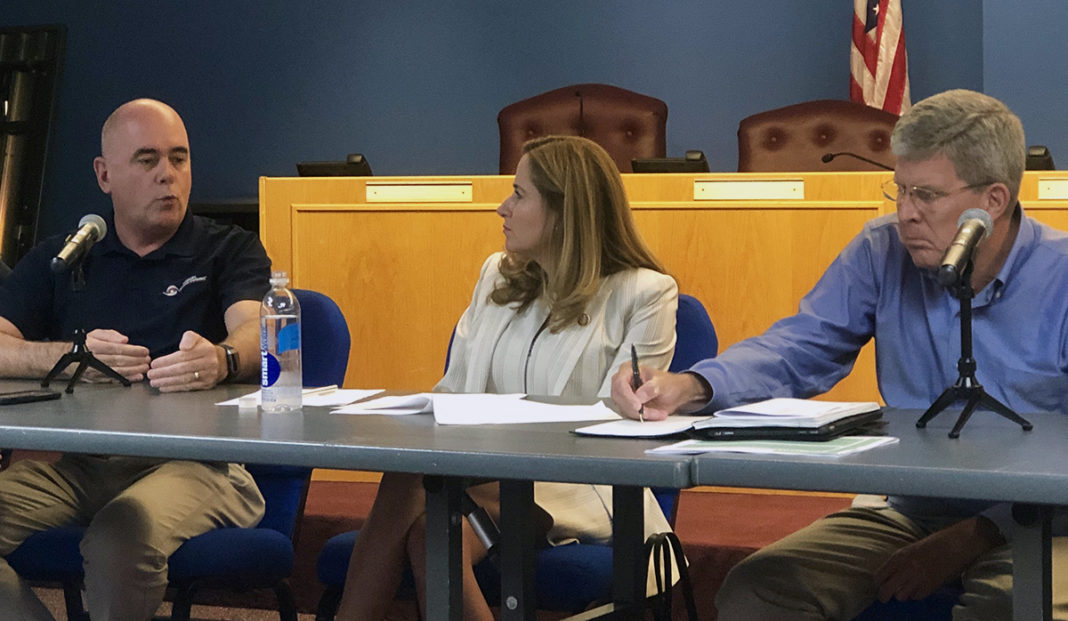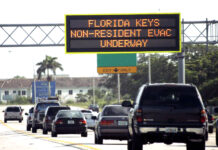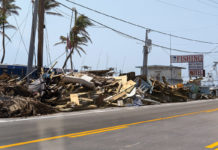Three days out from the start of the 2019 hurricane season, and the Florida Keys are still asking: where’s the 2017 money?
In a May 22 hearing of the House subcommittee that oversees emergency management, U.S. Rep. Debbie Mucarsel-Powell (District 26) pressed for answers. Questioning FEMA deputy administrator Daniel Kaniewski, Mucarsel-Powell asked why promised reimbursement funds for South Florida to pay for Hurricane Irma clean up have not been delivered.
“They are sitting on money that has already been approved,” she said after the hearing. “They were sitting on $299 million for Miami-Dade. After Friday, they approved $119 million for Miami-Dade.” The money will first go to the state, which must approve disbursement to counties and municipalities. Getting it in the state pipeline after nearly two years of waiting, however, is great news.
Can Monroe County hope for the same results in Washington?
Mucarsel-Powell seems to be listening. The congresswoman received a briefing and held a town hall panel on hurricane preparedness on May 28 at the Marathon Government Center, which included a who’s who of emergency management, law enforcement, and weather authorities from Key West to Marathon. As Mucarsel-Powell queried the local authorities about how she might best help in Washington, the refrain was the same: holding FEMA accountable.
For some context, the City of Marathon has received about $330,000 in reimbursement money from FEMA of the $32 million in hurricane-related expenses the city took on after Irma. Monroe County has submitted $50.4 million in projects for FEMA reimbursement. Fortunately, FEMA has approved $43.4 million of the Monroe County submitted expenses, but the pipeline is a slow and bureaucratic one. The approvals are sent to the state Department of Emergency Management for approval, then FEMA can obligate the money to the state for payment to the county. So far, the state has approved about $11.6 of the $43.4 million. The county has, as of May 28, received $7.8 million in reimbursement, out of over $50 million spent.
The county is going into 2019’s hurricane season in serious debt. The Monroe County took out a line of credit for $40 million to pay for recovery efforts, and County Administrator Roman Gastesi has expressed concern about the need to convert the line of credit into a long-term loan. Less than 12% of requested FEMA funding — from the county and the chief Keys municipalities — has been disbursed since Irma.
Mucarsel-Powell is trying to put a dent in the problem.
“I wanted to have this town hall discussion, because in about four days, hurricane season starts. And two years after Irma, we are still waiting to get reimbursements from FEMA,” said Mucarsel-Powell on May 28.
In attendance at the Town Hall were representatives from the county and cities: Chief Sean Brandenburg of the Key West Police Department; Major Chad Scibilia, Monroe County Sheriff’s Office Major of Operations; Key West Mayor Teri Johnston; Martin Senterfitt, director of emergency management for Monroe County; Jim Scholl, Key West city manager; Chuck Lindsey, Marathon city manager, Jonathan Rizzo, warning coordinator meteorologist for NOAA; and Kennard “Chip” Kasper, meteorologist-in-charge for the Florida Keys National Weather Service.
The chorus from local officials was the same: We need help holding FEMA accountable.
“Storms are getting more severe and more frequent,” said Chief Brandenburg, “It’s not too much to ask the federal government to do its part.”
Indeed, meteorologists Kasper and Rizzo confirmed that the National Weather Service is forecasting 9 to 15 named storms, with 2 to 4 intense hurricanes (Category 3 or stronger) in the 2019 hurricane season. Water temperatures are running higher than normal, but tempering weather conditions project a hurricane season they consider “normal.”
Even if the hurricane season is “normal,” rather than extreme, the county is running in the red.
“If we can’t restore the coffers,” said Lindsey, “it affects our ability to prepare for and respond to the next storm.”
While the panel agreed that the Keys did an exceptional job of strong communication and recovery efforts post-Irma, there was a sense of being gun-shy after all the money spent—and not reimbursed—after Irma.
“We try to be responsive and proactive. We are making very thoughtful, deliberate decisions,” said Senterfitt. He expressed the desire to continue to work independently in the Keys, not relying on FEMA for everything, as some other places do in the wake of a disaster. “We call in vendors and activate those contracts. But when FEMA challenges us, and we go back to this accounting process that costs months and years, and now we’re paying $80,000 and a month in interest … I understand why people rely on FEMA for everything, because they’ve been burned.”
“If we have another storm approaching us, unfortunately on those big ticket items, I am more likely to ask the federal or state government to pay, rather than front it and wait years for reimbursement,” he said.
“We had a pretty good evacuation during Irma,” Lindsay said, “But without being able to write a check, we have a problem.” He expressed the worry of being risk-averse. “It’s very dangerous.”
The danger doesn’t just lie in the finances, but also citizens remaining in the Keys after a mandatory evacuation. The panel was in agreement that leaving when instructed to promises the smoothest recovery possible.
And what can our congresswoman do? The panel had several ideas.
First, create legislation that outlines “hard deadlines” for FEMA — and then hold the agency to them. Mucarsel-Powell said she hasn’t seen a bill that does that exactly, but that it’s possible. The officials also asked how Mucarsel-Powell might advocate for de-centralizing FEMA’s power structure, sending representatives to the site of the disaster who have “signature authority.”
After Irma, Senterfitt said, “No one from FEMA was really authorized to make a decision.”
These changes might be policy changes within FEMA — requiring higher ups to be on the ground during disaster relief, sitting at the table in the EOC with local and state representatives.
They also asked for coordination with federal transportation officials and FDOT for hardening of bridges and roads, and for Mucarsel-Powell or aides on her team to be present in EOC discussions after the storm, to witness what is promised versus what is delivered.
Mucarsel-Powell thanked those in attendance and promised to follow up. “We are already in the red in Monroe County, and if we get hit by another storm, even a minimal storm, it can cause severe damage. I will be back in D.C. next week and will ask about reimbursements for Monroe,” she said.


























